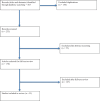Health inequities among persons with disabilities: a global scoping review
- PMID: 39995629
- PMCID: PMC11849497
- DOI: 10.3389/fpubh.2025.1538519
Health inequities among persons with disabilities: a global scoping review
Abstract
Background and objective: Approximately 16% of the global population, or 1.3 billion individuals, live with disabilities, facing increased health risks. Despite international and national policies affirming the rights of persons with disabilities, healthcare disparities persist, with studies revealing higher rates of unmet medical needs, avoidable deaths, and dissatisfaction with healthcare services among this population. This scoping review aims to provide a comprehensive overview of health inequities experienced by individuals with disabilities globally.
Methods: A rapid scoping review methodology was employed to systematically search and analyze quantitative evidence on health inequities. Electronic searches were conducted in CINAHL, MEDLINE, and PsycINFO databases, supplemented by manual searches of reference lists. The selection criteria for articles in this study were as follows: (a) publication between 2011 and 2022, (b) written in English, (c) published in a peer-reviewed scholarly journal, and (d) a quantitative comparison of health inequities between persons with and without disabilities.
Results: A total of 363 scholarly works were initially identified, with 51 meeting the inclusion criteria after rigorous screening. In the course of our review, our team identified three overarching themes of health inequity, encompassing (a) access to healthcare and resources, (b) morbidity, mortality, & risk factors, and (c) social determinants of health. These studies collectively reveal disparities in healthcare access, utilization, and outcomes among persons with disabilities, highlighting the urgent need for targeted interventions to address systemic barriers and promote equitable healthcare provision.
Conclusion: This review underscores the challenges faced by individuals with disabilities in accessing quality healthcare and imperative for concerted efforts to advance health equity.
Keywords: disability; health disparities; health inequities; rehabilitation disparities; scoping review.
Copyright © 2025 Umucu, Vernon, Pan, Qin, Solis, Campa and Lee.
Conflict of interest statement
The authors declare that the research was conducted in the absence of any commercial or financial relationships that could be construed as a potential conflict of interest. The author(s) declared that they were an editorial board member of Frontiers, at the time of submission. This had no impact on the peer review process and the final decision.
References
-
- World Health Organization . (2022). Global report on health equity for persons with disabilities. Available at: https://iris.who.int/bitstream/handle/10665/364834/9789240063600-eng.pdf...
-
- Ko KD, Lee KY, Cho B, Park MS, Son KY, Ha JH, et al. . Disparities in health-risk behaviors, preventive health care utilizations, and chronic health conditions for people with disabilities: the Korean National Health and nutrition examination survey. Arch Phys Med Rehabil. (2011) 92:1230–7. doi: 10.1016/j.apmr.2011.03.004, PMID: - DOI - PubMed
-
- Mitra M, Long-Bellil L, Moura I, Miles A, Kaye HS. Advancing health equity and reducing health disparities for people with disabilities in the United States: study examines health equity and health disparities for people with disabilities in the United States. Health Aff. (2022) 41:1379–86. doi: 10.1377/hlthaff.2022.00499, PMID: - DOI - PubMed
Publication types
MeSH terms
LinkOut - more resources
Full Text Sources
Medical


